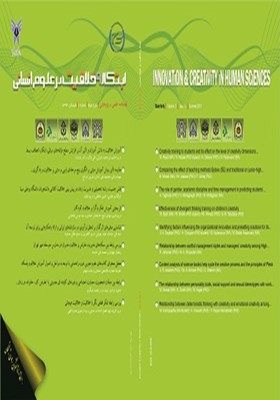بررسی رابطه بین سبکهای مدیریت تعارض و خلاقیت مدیران در مدارس متوسطه شهر تهران
محورهای موضوعی : خلاقیت و نوآوری از جنبه‏های روان‏شناختی، علوم شناختی، علوم تربیتی و آموزشی (خلاقیت شناسی روان‏شناختی، خلاقیت شناسی پرورشی)رمضان جهانیان 1 , محمد علی شایسته 2
1 - نویسنده مسئول
2 - نویسنده
کلید واژه: خلاقیت, مدیریت تعارض, مدیران, مدارس,
چکیده مقاله :
زمینه: امروزه به خاطر تغییرات روز افزون و پرشتاب جوامع بشری و نقش کلیدی تعلیم و تربیت در تربیت نسل خلاق، اهمیت و ضرورت خلاقیت و عوامل مؤثر بر آن بیش از هر زمان دیگر مشهود است. هدف:بررسی رابطه بین سبکهای مدیریت تعارض و میزان خلاقیت مدیران، در مدارس متوسطه شهر تهران. روش: روش این پژوهش، توصیفی از نوع همبستگی است. جامعه آماری، همه مدیران مدارس متوسطه شهر تهران در سال1389 (تعداد 1363 نفر) است. نمونه آماری با روش تصادفی سیستماتیک (تعداد 300 نفر) و با استفاده از جدول تعیین حجم نمونه مورگان انتخاب گردید. ابزار گردآوری دادهها دو پرسشنامه است: سبکهای مدیریت تعارض و پرسشنامهی سنجش خلاقیت (رندسیپ). یافتهها: نتایج به دست آمده نشان داد که بین سبک تشریک مساعی، سبک مــــدارا (انعطـــــافپذیــــری) و سبک مصالحــــه (تــــوافق) و خلاقیت مدیران آموزشی رابطه مثبت و معناداری وجود دارد. اما بین سبک تحکــــم (رقابتجــــویی) و سبکاجتنـــــــابو خلاقیت مدیران آموزشی رابطه معکوس برقرار است. نتیجه گیری: هرچه مدیران آموزش و پرورش در فرایند مدیریت تعارض با مدیران مدارس، مدارا و تشریک مساعی نمایند، میزان خلاقیتمدیران در مدارس بیشتر میشود و هرچه در این تعامل با تحکم و فشار رفتار کنند میزان خلاقیت مدیران در مدارس کاهش مییابد.
Background: Nowadays, due to increasing and rapid changing societies and plays a key role of education in educating a generation of creative, the importance and necessity of creativity and factors affecting it more evident than ever. Objective: The present study is conducted in an attempt to investigate the relationship between conflict management styles and manager's creativity in Tehran high schools. Method: the method applied in this study is descriptive correlation method. The population contains all high school managers in Tehran (1363 participants) and the sample of the study includes 300 subjects who were selected according to Morgan's table for determining sample size on the basis of stratified random sampling. Tools used for data collection are two standard questionnaires: styles of conflict management questionnaire and creativity questionnaire. Result (s): The obtained results indicates that there is a positive significant relationship between cooperation style ,reconciliation style, collaboration style and compromise style of conflict management and educational managers’ creativity; however, there is a reverse relationship between domineering (competitive) and avoiding styles of conflict management and educational managers’ creativity. Conclusions: In the process of conflict management, the more the education managers cooperate and re-conciliate with school managers, the more school managers' creativity will increase; on the other hand, if the education managers treat them with pressure and domination, it will lead to less creativity school managers in schools.


